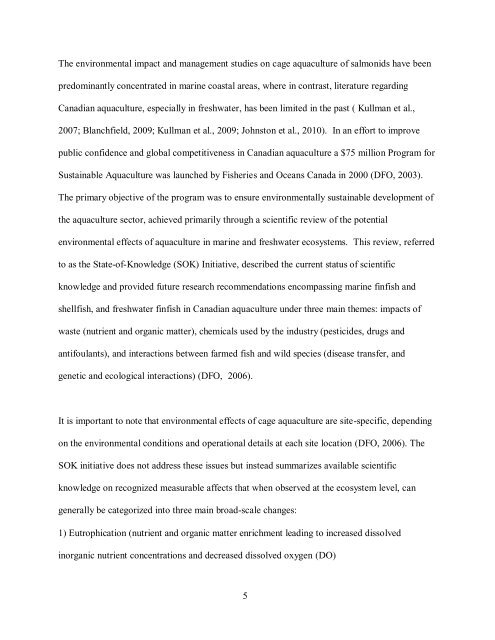Role of Temperature and Organic Degradation on the Persistence of ...
Role of Temperature and Organic Degradation on the Persistence of ...
Role of Temperature and Organic Degradation on the Persistence of ...
You also want an ePaper? Increase the reach of your titles
YUMPU automatically turns print PDFs into web optimized ePapers that Google loves.
The envir<strong>on</strong>mental impact <str<strong>on</strong>g>and</str<strong>on</strong>g> management studies <strong>on</strong> cage aquaculture <str<strong>on</strong>g>of</str<strong>on</strong>g> salm<strong>on</strong>ids have been<br />
predominantly c<strong>on</strong>centrated in marine coastal areas, where in c<strong>on</strong>trast, literature regarding<br />
Canadian aquaculture, especially in freshwater, has been limited in <strong>the</strong> past ( Kullman et al.,<br />
2007; Blanchfield, 2009; Kullman et al., 2009; Johnst<strong>on</strong> et al., 2010). In an effort to improve<br />
public c<strong>on</strong>fidence <str<strong>on</strong>g>and</str<strong>on</strong>g> global competitiveness in Canadian aquaculture a $75 milli<strong>on</strong> Program for<br />
Sustainable Aquaculture was launched by Fisheries <str<strong>on</strong>g>and</str<strong>on</strong>g> Oceans Canada in 2000 (DFO, 2003).<br />
The primary objective <str<strong>on</strong>g>of</str<strong>on</strong>g> <strong>the</strong> program was to ensure envir<strong>on</strong>mentally sustainable development <str<strong>on</strong>g>of</str<strong>on</strong>g><br />
<strong>the</strong> aquaculture sector, achieved primarily through a scientific review <str<strong>on</strong>g>of</str<strong>on</strong>g> <strong>the</strong> potential<br />
envir<strong>on</strong>mental effects <str<strong>on</strong>g>of</str<strong>on</strong>g> aquaculture in marine <str<strong>on</strong>g>and</str<strong>on</strong>g> freshwater ecosystems. This review, referred<br />
to as <strong>the</strong> State-<str<strong>on</strong>g>of</str<strong>on</strong>g>-Knowledge (SOK) Initiative, described <strong>the</strong> current status <str<strong>on</strong>g>of</str<strong>on</strong>g> scientific<br />
knowledge <str<strong>on</strong>g>and</str<strong>on</strong>g> provided future research recommendati<strong>on</strong>s encompassing marine finfish <str<strong>on</strong>g>and</str<strong>on</strong>g><br />
shellfish, <str<strong>on</strong>g>and</str<strong>on</strong>g> freshwater finfish in Canadian aquaculture under three main <strong>the</strong>mes: impacts <str<strong>on</strong>g>of</str<strong>on</strong>g><br />
waste (nutrient <str<strong>on</strong>g>and</str<strong>on</strong>g> organic matter), chemicals used by <strong>the</strong> industry (pesticides, drugs <str<strong>on</strong>g>and</str<strong>on</strong>g><br />
antifoulants), <str<strong>on</strong>g>and</str<strong>on</strong>g> interacti<strong>on</strong>s between farmed fish <str<strong>on</strong>g>and</str<strong>on</strong>g> wild species (disease transfer, <str<strong>on</strong>g>and</str<strong>on</strong>g><br />
genetic <str<strong>on</strong>g>and</str<strong>on</strong>g> ecological interacti<strong>on</strong>s) (DFO, 2006).<br />
It is important to note that envir<strong>on</strong>mental effects <str<strong>on</strong>g>of</str<strong>on</strong>g> cage aquaculture are site-specific, depending<br />
<strong>on</strong> <strong>the</strong> envir<strong>on</strong>mental c<strong>on</strong>diti<strong>on</strong>s <str<strong>on</strong>g>and</str<strong>on</strong>g> operati<strong>on</strong>al details at each site locati<strong>on</strong> (DFO, 2006). The<br />
SOK initiative does not address <strong>the</strong>se issues but instead summarizes available scientific<br />
knowledge <strong>on</strong> recognized measurable affects that when observed at <strong>the</strong> ecosystem level, can<br />
generally be categorized into three main broad-scale changes:<br />
1) Eutrophicati<strong>on</strong> (nutrient <str<strong>on</strong>g>and</str<strong>on</strong>g> organic matter enrichment leading to increased dissolved<br />
inorganic nutrient c<strong>on</strong>centrati<strong>on</strong>s <str<strong>on</strong>g>and</str<strong>on</strong>g> decreased dissolved oxygen (DO)<br />
5
















